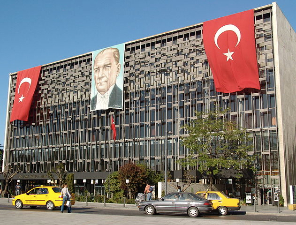What the Columnists Say
President Recep Tayyip Erdoğan’s recent statement that Muslims were the ones who discovered the Americas have stimulated many commentators to draw parallels to Atatürk who claimed that Turks from Central Asia had founded all the significant civilizations in the world. Murat Belge writes that Atatürk’s “Sun-Language Theory” was no less “ridiculous” than the theory about “Muslims in America.” Fatih Yaşlı disagrees, saying that the early republic and Erdoğan’s new Turkey cannot be compared, as the latter embodies an ambition to install a religiously authoritarian system. Ahmet İnsel writes that one important reason why the AKP has been able to perpetuate its hegemony is the way many modern, secular “progressives” look at people from the lower classes, that they accuse them of selling their votes in return for social welfare benefits. Yüksel Taşkın challenges the claim of Kemalists and many leftists that the liberals were responsible for paving the way for the ascent of the AKP. He writes that Kemalists were chiefly responsible for this, while the trouble for liberals is that they find it difficult to discard the notion that history inexorably progresses toward a positive ending.

Turkey Sees Itself as the Target of American "Imperial Designs"
By Halil Karaveli (vol. 7, no. 20 of the Turkey Analyst)
The neo-Ottomans are reverting to Kemalism. From having aspired to be the rule-setter of the Middle East, President Recep Tayyip Erdoğan is now exhibiting neo-Kemalist traits, accusing the Western powers of harboring imperial designs against Turkey. For Turks of all stripes assuming the worst about Western “imperialists” is natural. But that also means that the fears that their prejudices entertain risk becoming self-fulfilling prophecies.

Erdogan's War: Will Turkey's Most Powerful Leader Since Ataturk Succeed in Securing the Country's Unity?
By Halil M. Karaveli (vol. 4, no. 16 of the Turkey Analyst)
Attacks carried out by Kurdish separatists since mid-July have set Turkey on the road to war. The Turkish government is determined to exact a heavy price from the Kurdish insurgents, and the PKK militants seem to be as determined to provoke an ethnic conflagration. As he is about to teach the Kurdish insurgents a severe lesson, Prime Minister Recep Tayyip Erdoğan faces what could be the greatest challenge of his career. The question is if the unparalleled power and authority that Erdoğan has assembled will ultimately suffice to secure Turkey’s unity.
Will Clinging to the EU and Atatürk Save the AKP?
By the Editors (vol. 1, no. 5 of the Turkey Analyst)
Just as it has been faced with the threat of dissolution, the AKP’s faith in Europe has been rekindled. More remarkably, the party is even clinging to the Atatürk legacy in an unprecedented way. The AKP’s change of heart is testimony to the party’s distress. Although displays of “kemalism”, in particular, are confusing, the new rhetoric has not convinced analysts that the party’s ideological orientation has been altered.
Revolution and Counter-Revolution: Kemalism, the AKP and Turkey at 90
By Gareth Jenkins (vol. 6, no. 20 of the Turkey Analyst)
Ninety years after its foundation on October 29, 1923, the Turkish Republic is already radically different to how its founder, Mustafa Kemal Atatürk (1881-1938), intended. More change seems inevitable. Since it first took office in November 2002, the Justice and Development Party (AKP) has gradually dismantled Atatürk’s ideological legacy. In its place, the AKP has introduced not a pluralistic democracy but a new form of authoritarianism.





